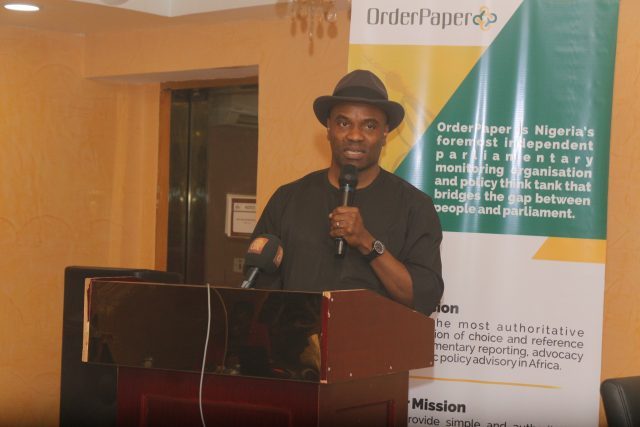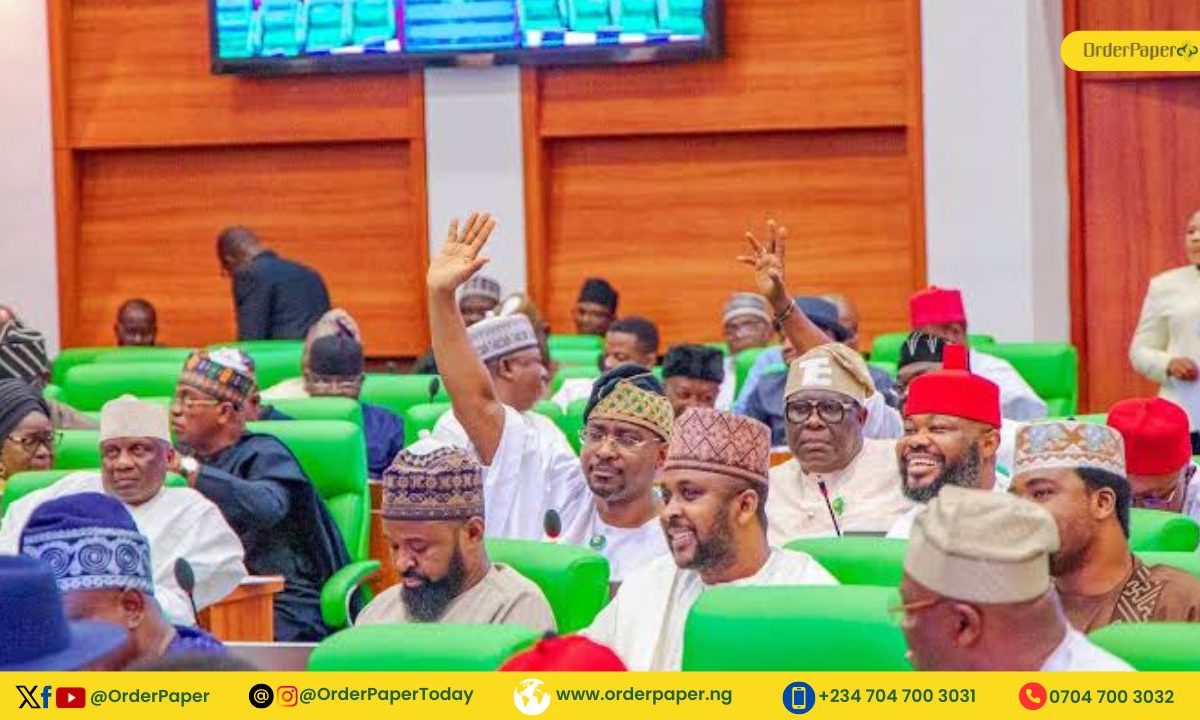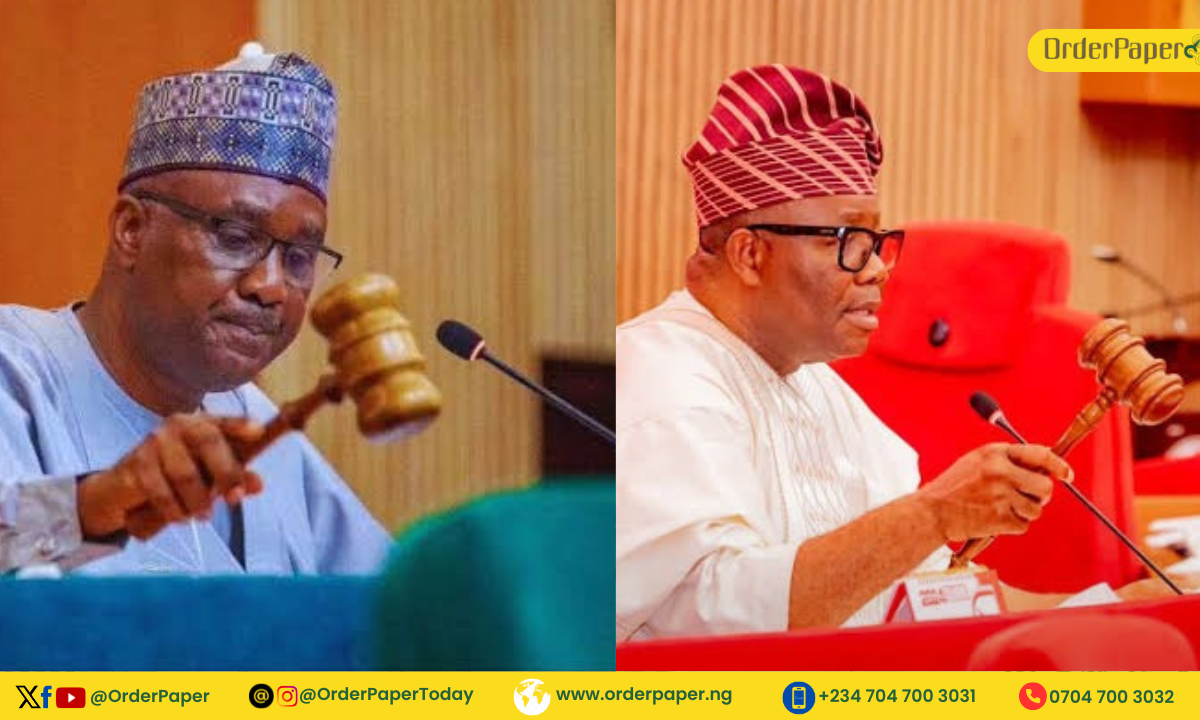The private sector in Nigeria has been encouraged to improve on its implementation of constituency projects. This appeal was made at the policy dialogue on the role of the private sector in the implementation of constituency projects organised by OrderPaper.

The Senate Leader of the 10th assembly, Sen. Micheal Opeyemi Bamidele (APC, Ekiti Central), has called on the private sector to enhance its involvement in Zonal Intervention Projects (ZIPs) also known as constituency projects, ensuring these projects are executed efficiently and sustainably.
Bamidele made this known while speaking at a policy dialogue on the role of the private sector in the implementation of constituency projects in Nigeria on Monday, September 23, in Abuja.
The dialogue organised by OrderPaper Advocacy Initiative, Nigeria’s foremost parliamentary monitoring organisation, spotlighted the critical role of the private sector in the implementation of constituency projects in Nigeria.
Bamidele, who was represented by Oluseyi Olubanjo, Special adviser to the senate president, encouraged the private sector to join forces with the government through public-private partnerships (PPPs) to fund constituency projects across the country.
“The reality of our times is that government resources alone are not enough to fund the numerous constituency projects across the country. Budgetary constraints, rising demands for services, and competing priorities at the national level have left many of these projects underfunded, delayed, or abandoned. This is where the private sector can step in through public-private partnerships (PPPs). By providing additional funding, the private sector can supplement government efforts to ensure that projects are completed on time and within budget.” he said.
He disclosed that leveraging the technical expertise of private companies can revolutionise the way constituency projects are being implemented as their wealth of knowledge can ensure projects are completed more efficiently, at lower costs, and with higher quality.
He added that the private sector can play a crucial role in promoting a culture of accountability amidst the current concerns on transparency and accountability, adding that it can help introduce strong monitoring and evaluation frameworks that track the progress and quality of constituency projects.
“When private companies invest their resources, they do so with an interest in ensuring their investment yields tangible results. As a result, they can help introduce strong monitoring and evaluation frameworks that track the progress and quality of constituency projects.”
“Through collaborations with civil society organizations, local governments, and the media, the private sector can ensure that projects are executed in a transparent manner, with measurable outcomes that truly benefit the people.”
The lawmaker described the contractors as the on-the-ground executors of constituency projects who have a unique responsibility to ensure that constituency projects are delivered efficiently, transparently, and with full accountability.
According to him, contractors have a fundamental duty to promote openness in every phase of project execution as such is not only essential for building public trust but also for ensuring that projects are delivered according to the agreed specifications. He recommended some practices for promoting transparency in project execution which include open communication with stakeholders, disclosure of financials and project costs as well as public access to Information.
READ ALSO: NASS to partner CSOs 5o strengthen execution of constituency projects – Senator Barau
He further encouraged contractors to work in collaboration with government agencies, community leaders and oversight bodies to ensure the smooth and accountable implementation of projects through regular reporting of progress on the contract, supporting independent audits on the project and engaging with the communities on a regular basis.
He thereafter reiterated the national assembly’s commitment to enacting and strengthening legislative frameworks that govern the implementation of constituency projects.

In his opening remarks, Oke Epia, the Executive Director of OrderPaper, affirmed the critical roles that the private sector plays in the actualization of constituency projects stating that professional bodies within the private sector can ensure adherence to best practices and discipline members who fail to meet these standards, ensuring project integrity.
“The private sector can bring valuable knowledge, skills, and resources to ensure that constituency projects are delivered efficiently and meet quality standards. By ensuring adherence to ethical practices, the private sector fosters public trust and guarantees that projects have a lasting impact on communities.” he said.
He entreated players of the private sector to make use of the ConsTrack civic tech tool, an initiative of OrderPaper for tracking constituency projects, in administering their contracts.
He said they can do this by sharing accurate information on project costs, timelines and scope, engaging with citizen feedback and reports to improve project outcomes, address concerns and ensure adherence to agreed project standards. They can also regularly share updates on project progress through the ConsTrack platform sharing challenges, milestones, and completion stages to ensure public accountability.
He assured that interacting with the ConsTrack platform will go a long way in fostering trust, maintaining transparency, and mitigating corruption risks.



